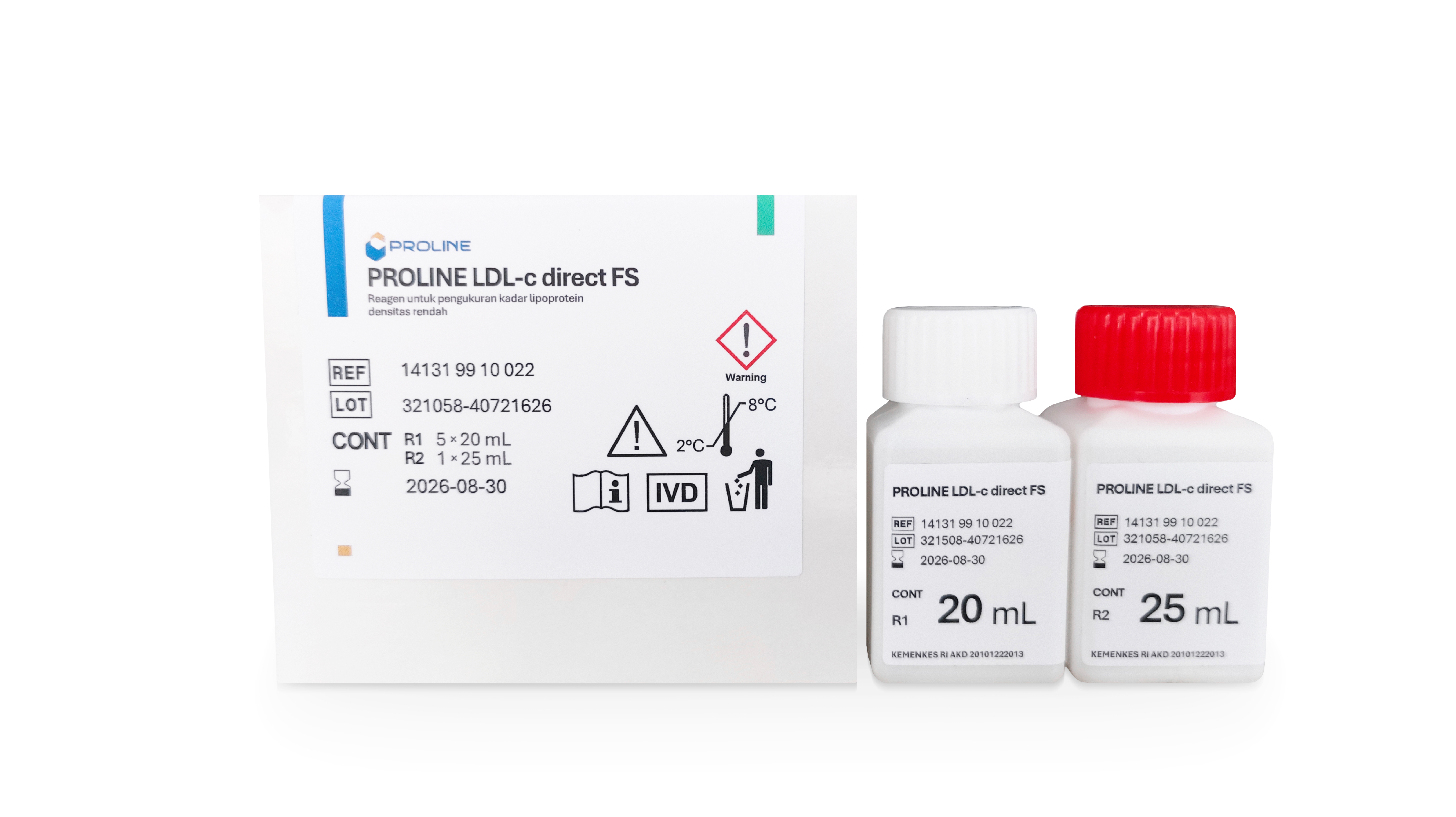PROLINE LDL-c direct FS

| Catalog Number | R1 Reagent Volume | R2 Reagent Volume |
| 14131 99 10 022 | 5 x 20 mL | 1 x 25 mL |
| 14131 99 10 025 | 3 x 80 mL | 1 x 60 mL |
| 14131 99 10 029 | 3 x 200 mL | 1 x 150 mL |
| 14131 99 10 920 | 4 x 38 mL | 4 x 11 mL |
| 14131 99 10 921 | 4 x 23 mL | 4 x 7 mL |
| 14131 99 10 181 | 4 x 36 mL | 4 x 9 mL |
| 14131 99 10 191 | 4 x 36 mL | 4 x 9 mL |
Diagnostic reagent for the quantitative measurement of low-density lipoprotein cholesterol (LDL-c) in human serum or human heparin plasma in vitro using a photometric system.
Low-Density Lipoprotein (LDL) is a type of lipoprotein that serves as the primary transporter of cholesterol in the blood, carrying it from the liver to the body’s cells. LDL contains a high amount of cholesterol and a lower amount of protein, which makes it less dense than High-Density Lipoprotein (HDL). In medical contexts, LDL is often referred to as "bad cholesterol" due to its potential to cause cholesterol buildup in the walls of blood vessels.
Despite its negative reputation, LDL plays an essential role in the body. The cholesterol carried by LDL is used in the synthesis of steroid hormones, vitamin D, and bile acids, and is also crucial for maintaining the integrity of cell membranes. Without LDL, the distribution of cholesterol to tissues would be inadequate, affecting various cellular functions that require cholesterol as a structural component.
Excessive levels of LDL in the blood can lead to atherosclerosis—plaque buildup in the arterial walls—which narrows blood vessels and increases the risk of coronary heart disease and stroke. Therefore, monitoring LDL levels is vital in preventing cardiovascular diseases. Maintaining a healthy lifestyle, a diet low in saturated fats, and regular physical activity are key strategies to keep LDL levels within a normal range.
Using a homogeneous method for measuring LDL cholesterol without the need for centrifugation steps (direct method).
- Ready-to-use liquid reagent (open-system) without reconstitution
- Excellent linearity and stability performance
- Available in MPK (Multi-Purpose Kit) and dedicated kit
- Compatible with >65 brands of manual and automated clinical chemistry analyzers
| Sample type | Human serum or lithium heparin plasma |
| Measurement range | 6 mg/dL - 500 mg/dL |
| Analysis wavelength | 578 nm (550 – 650 nm) |
| Analysis mode | End-Point |
| Reagent volume used (analyzer manual) | R1: 1000 µL ; R2: 250 µL |
| Sample volume used (analyzer manual) | 10 µL |
| Storage temperature | 2 – 8 °C |
| Open vial stability | 18 months |
| Expiration date | 18 months |
| Control for LDL Reagent | Calibrator for LDL Reagent |
| TruLab L Level 1 | TruCal Lipid |
| TruLab L Level 2 |
| Reference Range: | ||
| mg/dL | mmol/L | |
| Desired | < 100 | < 2.59 |
| Above optimal | 100 - 129 | 2.59 - 3.34 |
| High risk threshold | 130 - 159 | 3.37 - 4.12 |
| High risk | 160 - 189 | 4.14 - 4.90 |
| Very high risk | > 190 | > 4.92 |
- LDL-c direct reagent
- Doos
- Kit insert
- Reagents bottle
- Kit Insert PROLINE LDL-c Direct FS (14131 01 – Nov 2024/02).
- Goldstein, J. L., & Brown, M. S. (2015). A century of cholesterol and coronaries: from plaques to genes to statins. Cell, 161(1), 161–172. https://doi.org/10.1016/j.cell.2015.01.036
- Tabas, I., Williams, K. J., & Boren, J. (2007). Subendothelial lipoprotein retention as the initiating process in atherosclerosis: update and therapeutic implications. Circulation, 116(16), 1832–1844. https://doi.org/10.1161/CIRCULATIONAHA.106.676890
- Ference, B. A., et al. (2017). Low-density lipoproteins cause atherosclerotic cardiovascular disease. 1. Evidence from genetic, epidemiologic, and clinical studies. A consensus statement from the European Atherosclerosis Society Consensus Panel. European Heart Journal, 38(32), 2459–2472. https://doi.org/10.1093/eurheartj/ehx144
- Brochure : INA
- Atherosclerosis
- Lipid Metabolism
Contact our team to find out more product information and ordering
- Telp : +62 21 8984 2722
- WhatsApp : +62 815 1359 2626
- Email : marketing@proline.co.id
Contact our Technical support team for further assistance with product specifications, services and other technical documents.
- Telp : +62-21-8984-2722
- WhatsApp : +62-817-9324-884
- Email : technical.support@prodis.co.id
